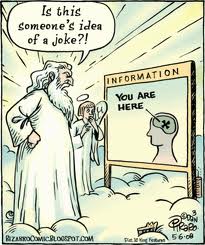The Plague of Phantom Beings
If a phantom Being attaches itself to a real being and preys on her/him, one could call it a parasite. Many scholars, however, protest against such a notion, thinking that a phantom Being is rather a product of real being, the by-product of the normal production process of consciousness. A logician could say that a phantom Being is a peculiar transformation of a hypothesis into hypostasis; a wobbly hypothesis which, supported by a strong conviction, becomes unquestionable obviousness. Phantom Beings, nestled in the consciousness of a multigenerational society, can in some respects remind you of parasites, because they are leaked from the surroundings into an individual organism; they cannot exist independently and need carriers.
Phantom Beings speak through the mouths of their carriers, who nonetheless - in order to give authority to phantom Beings - have built shrines for them, and the ostentatious grandeur of those shrines creates an appearance of logical negation of the sham nature of the phantom Being. (What reasonable person would build such grand and costly shrines to something that doesn't exist?) The modesty of a phantom Being's servant can be a source of his power and greatness. In the shadow of shrines of the Non-Existent, civilizations were born. Shrines of phantom Beings have been built for several thousand years, and for a long time their construction seemed to be beyond the technical capabilities of humanity. In time the hubris of more affluent real beings pushed them into competition, and the phantom Beings' servants lost their monopoly of knowledge, both in the field of construction and in other fields.
The superiority of a phantom Being over a real being manifests itself first of all in the area of moral authority. You can quarrel with a real being, you can discuss matters with him, you can physically annihilate him. It is not that easy with a phantom Being. By definition the last word always belongs to a phantom Being. A moral authority shows the way to distinguish between good and evil. Several problems arise here - phantom Beings speak through their servants' mouths while evidence of direct statements by the phantom Beings themselves are rare, murky, and doubtful. Servants of those Beings fulfil the role of moral authority by proxy, and their announcements are mainly a communication channel between phantom Beings and real beings who strive towards perfection in the shadows of the shrines.
Does the power of the moral authority of a specific phantom Being reside in his moral perfection or in the density of the chain of shrines and the numerical superiority of one phantom Being's followers over the followers of other phantom Beings? There are many suggestions that we are dealing here with a complex phenomenon in which the category "good" and the category "social cohesion" are treated as equivalents. Social cohesion is treated as a good which allows one society to gain advantage over societies gathered in the shadows of shrines of another phantom Being. Here a tendency (and aspiration) can be seen to transform locality into universality and temporality into eternity.
The struggle for primacy of one phantom Being over other phantom Beings can be suspended in the face of a threatening discussion about the nature of phantom Beings and the ebb of real beings from the shrines for phantom Beings. Such a threat was behind the idea of setting up the United Phantom Beings Organization (UPBO), which on the one hand would work towards a reduction of conflicts between representatives of different phantom Beings, and on the other for a common front of phantom Beings against rationalism.
While the idea is relatively new, we can see serious difficulties in selecting the moral authority capable of coordinating a whole cluster of moral authorities. It is unclear if the highest moral authority should be chosen for good or shared on a rota basis. Because all phantom Beings by definition must be seen by real beings as the highest moral authorities, UPBO came to a standstill. An attempt to convince representatives of those different phantom Beings that the chairman of UPBO is not automatically a representative of the absolute of absolutes, that he can be a representative of a democratic absolute who does not feel himself to be a superior absolute to the remaining absolutes, failed because of some inherent contradictions.
A being does not mean something really in a state of being. This phenomenon was verbalized the by philosopher Martin Heidegger, who divided beings into real beings, ideal beings, intentional beings and absolute beings. The servants of Phantom Beings made this discovery thousands of years before him, but the philosopher made it clear: the existence of a being is irrelevant. Moreover, he presented premises allowing the conclusion that the way of a being to absoluteness goes through non-being.
For a moment it was thought that the broad public had lost interest in the idea of phantom Beings transformed into an absolute, had started to refuse to acknowledge the superiority of phantom Beings over real beings, and were abandoning the shrines of phantom Beings. However, the lack of a phantom Being dangerously revealed the burden of actually being and that (at least in societies aspiring to development) gave rise to an explosive revival of phantom Beings. One suspects that the vitality of phantom Beings equals the square distance from the greatest concentration of practical skills, that is, from the knowledge society. There are here, however, some non-standard deviations, implying the presence of other factors.
The fact of an unusually common transformation of benign phantom Beings into virulent phantom Beings, which we have recently observed, is intriguing. It seems that without an explanation for this phenomenon we don't have much chance of finding an effective antidote. There are many hypotheses, but none has been confirmed by independent research. For the moment the only prophylaxis is to keep to reality as well as disseminating information to the broad public about the dangers caused by a hunger for the absolute.
